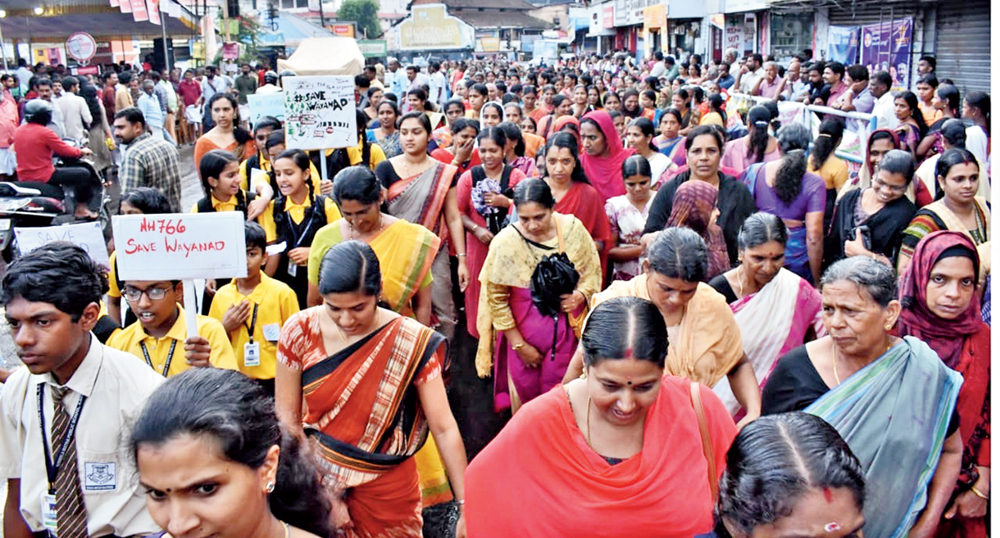A night traffic ban on a 25km stretch of road through the Karnataka part of the Bandipur Tiger Reserve has aggrieved Wayanad so much that it brought Rahul Gandhi and the Kerala BJP president on the same page last week.
The 9pm-to-6am traffic ban is a decade old and was imposed by the local authorities in Karnataka because speeding vehicles were taking a heavy toll on animal life in the forest.
Everybody in Kerala, including its government, has since then been demanding its revocation because Wayanad considers National Highway 766, of which this 25km stretch is a part, as its “economic lifeline”.
But with animal lovers and environmentalists rising to support the ban, the matter has been stuck in the courts.
Two fresh factors have now stiffened Wayanad’s opposition to the ban, leading thousands to hit the streets over the last fortnight, with all the political parties and several apolitical organisations joining in.
One, as local Congress functionary P.C. Assainar explained, “when floods and landslides marooned Wayanad from all sides last year, the only option was to travel to Karnataka to save our lives — that’s also why we call the NH-766 our lifeline”. But the road was closed at night.
Two, on August 7, the Supreme Court suggested shutting the forest stretch of the NH-766 altogether and upgrading alternative roads that the agitators claim involve long detours.
“We are already troubled by this night traffic ban, now there’s a possibility of the road itself being shut down,” Shamshad Marakkar, coordinator of the Youth Front, one of the spearheads of the agitation, told The Telegraph.
“We are not against forests or wildlife; our only plea is that our interests be considered as well,” Marakkar, also the district Youth Congress president, added.
“If the NH-766 is closed, we shall have to travel 220km in place of 45km to reach Gundlupet in Karnataka. Is this justice?”
But G.R. Mohan, a Bangalore lawyer and one of the animal lovers who have got themselves impleaded in the case, said: “We have submitted four different options (alternative routes) to the court. The alternative roads are longer by just 30km, and they bypass the forests.”
The agitators, however, claim the environmentalists have not taken into account the entire journey from Sultan Bathery in Wayanad to the market hub of Gundlupet in Karnataka while doing their calculations.
Assainar said it was along the NH-766 that Wayanad’s cash crop was ferried to Karnataka’s markets via the Gundlupet hub, and vegetables from the neighbouring state reached Wayanad.
For these crops to sell in the morning, they need to be transported at night. But the night traffic ban means that the vegetables now reach Wayanad only at noon, he said.
“The NH-766 also helps Karnataka’s farmers, who sell their produce in northern Kerala, and its labourers who commute daily to Wayanad to work for higher wages,” Assainar said.
On Friday, local MP Rahul Gandhi, who had made a pre-poll promise to get the ban eased, arrived at Sultan Bathery around 9am via Kozhikode and spent about an hour with the protesters.
Kerala BJP president P.S. Sreedharan Pillai had visited Wayanad on Thursday to support the agitators and urge Karnataka chief minister and party colleague B.S. Yediyurappa to take a “favourable stand to uphold the people’s right to travel”.
Yediyurappa’s stand so far has been that he cannot interfere with court orders.
After the Chamrajnagar district administration, which had imposed the ban in 2009, lifted it briefly, animal lovers had petitioned Karnataka High Court, which upheld the ban in 2010. Kerala challenged the ruling in the apex court the same year, and the case has been dragging on.










